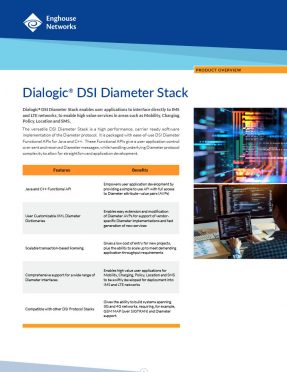Dialogic® Distributed Signaling Interface
Dialogic® Distributed Signaling Interface (DSI) Signaling Products offer network connectivity for mobile and wireline networks including support for 2G, 3G and 4G architectures.
The portfolio spans a range of deployment models from full turn-key network elements, such as the Dialogic® DSI Signaling Transfer Point (STP) which is deployed and configured without requiring any software development, through to protocol components, such as the Dialogic® DSI SS7, Sigtran and Diameter Protocol Stacks, which are designed for application enablement and allow developers to create bespoke applications that interface to other network elements to realize a wide range of value added services.
DSI Signaling Products are agnostic to the underlying platform allowing users to choose between deployment on commercial off the shelf servers, or in virtualized, on-premises environments or hosting the solution remotely in a cloud-based environment.
The capacity-based licensing model allows low-cost entry-level deployments plus the ability to scale to meet the most demanding application throughput requirements.
Features & Benefits
Proven worldwide deployment history with multiple operators
Global protocol support (including ITU-T, ANSI, China, Japan)
Scalable capacity-based licensing
Global support team on hand to address any issues
High level APIs reduce time to market for new applications
Wide choice of operating systems and deployment environments ease integration burden.
Application Enablement using Dialogic® DSI Diameter Stack
Dialogic® DSI Diameter Stack enables user applications to interface directly to IMS and LTE networks, to enable high value services in areas such as Mobility, Charging, Policy, Location and SMS.
The DSI Diameter Stack is a high performance, carrier ready software implementation of the Diameter protocol with easy-to-use DSI Diameter functional APIs for Java and C++. These functional APIs give a user application control over sent and received Diameter messages with full access to Diameter attribute-value pairs (AVP), while handling underlying Diameter protocol complexity to allow for straightforward application development.
A wide range of Diameter interfaces is supported as standard including for charging and Policy Ro, Rf, Gx, S9 & S9a, for Mobility S6a, S6d, S13 & S13’, for Location SLg & SLh, and for SMS S6c and SGd. User customizable XML Diameter dictionaries permit easy addition of new Diameter interfaces as well as modification of AVPs for vendor-specific Diameter extensions.
Application Enablement using Dialogic® DSI SS7 and Sigtran Protocol Stacks.
Dialogic® Distributed Signaling Interface (DSI) Protocol Stacks enable developers to build applications to interface directly to nodes within 2G and 3G mobile networks and wireline networks in areas such as mobility, messaging, location, authentication, charging, and call control.
Supported protocols include MAP and IS-41 for mobile networks, INAP (including CAMEL and AIN) for intelligent networks, and ISUP (including BICC) for call control. These protocols run in conjunction with TCAP, SCCP (Connectionless or Connection Oriented) and underlying transport protocols M3UA, or MTP3 (over MTP2 or M2PA). Physical connectivity is achieved either over IP using Sigtran SCTP or using E1/T1 TDM interfaces in conjunction with Dialogic® DSI Network Interface Boards.
Dialogic® DSI Protocol Stacks are complemented by the DSI run-time environment that coordinates inter-process communication, protocol configuration, management, logging, measurements, and run-time diagnostic tools.
Extending the Application to support E1/T1 connectivity using Dialogic® DSI SS7 Interface Boards.
Dialogic® Distributed Signaling Interface (DSI) Protocol Stacks support E1/T1 operation using a choice of two SS7 interface boards – SS7MD for high performance nodes and SS7LD for smaller, cost sensitive, lower throughput applications.
The SS7MD board is a High-density, low-profile PCI express board containing four individually configurable E1/T1 interfaces for deployment in commercial off the shelf servers. It supports up to 124, 64kb/s Low Speed Links (LSL), or up to four High Speed Links (HSL) and offers support for ATP over E1/T1. In addition to terminating SS7 links the board can be used in passive monitoring deployments and supports direct connection to protected monitoring points.
The SS7LD board is a Low-density, half-length, full height PCI express board containing four configurable E1/T1 interfaces for deployment in commercial off the shelf servers. It supports up to 16, 64kb/s Low Speed Links (LSL).
